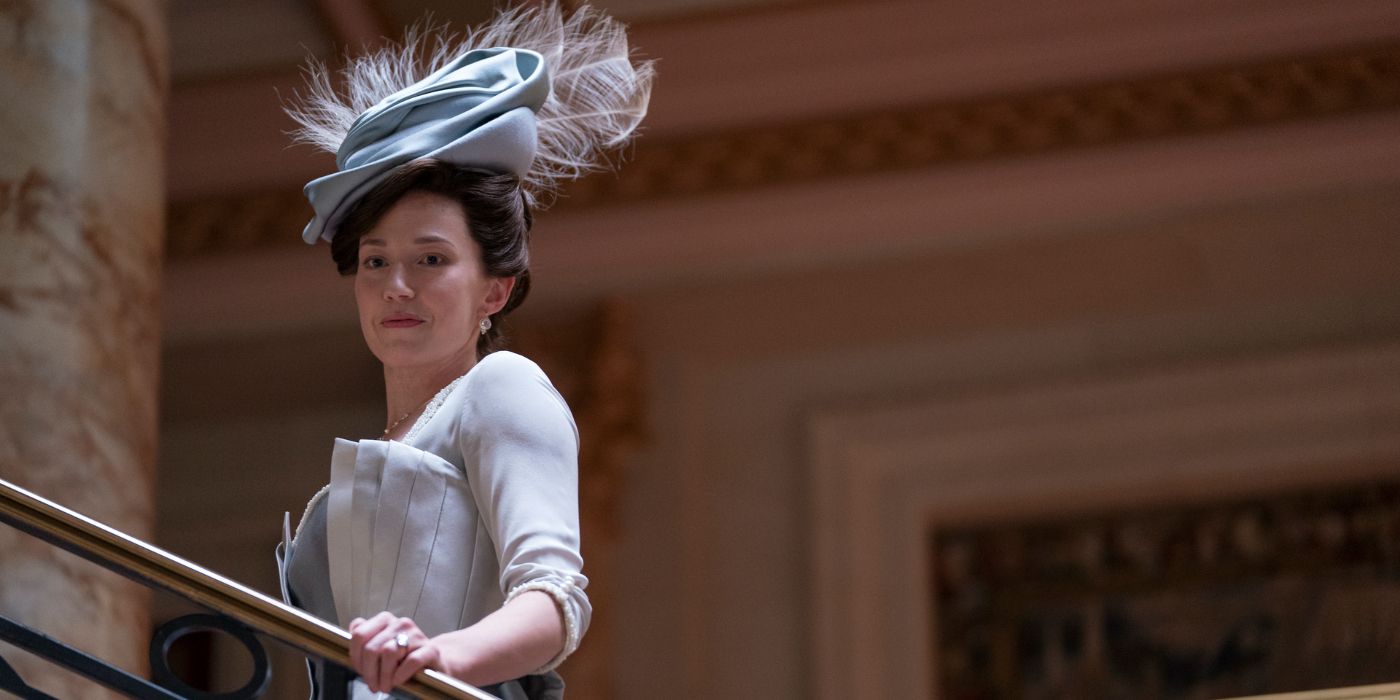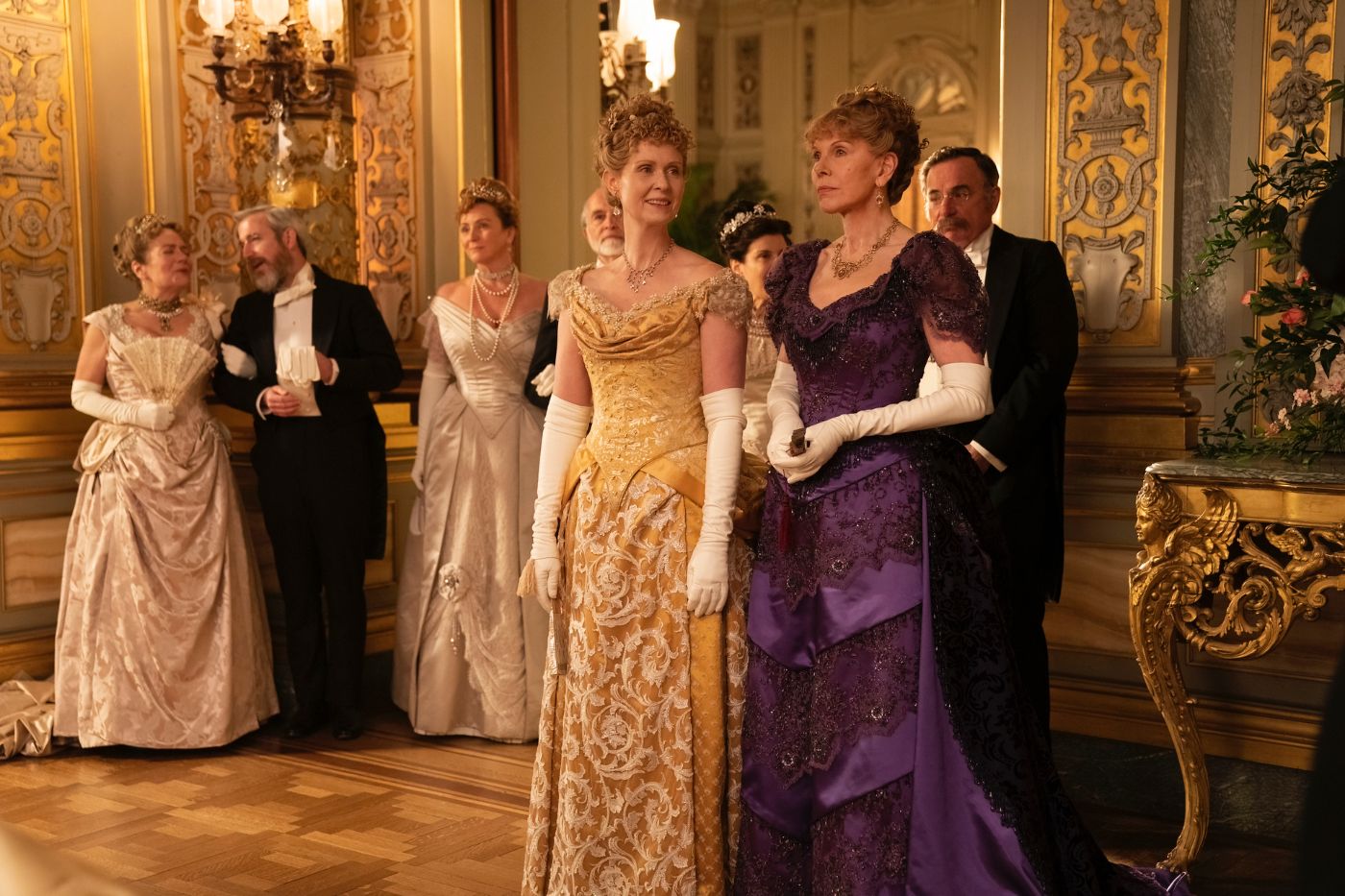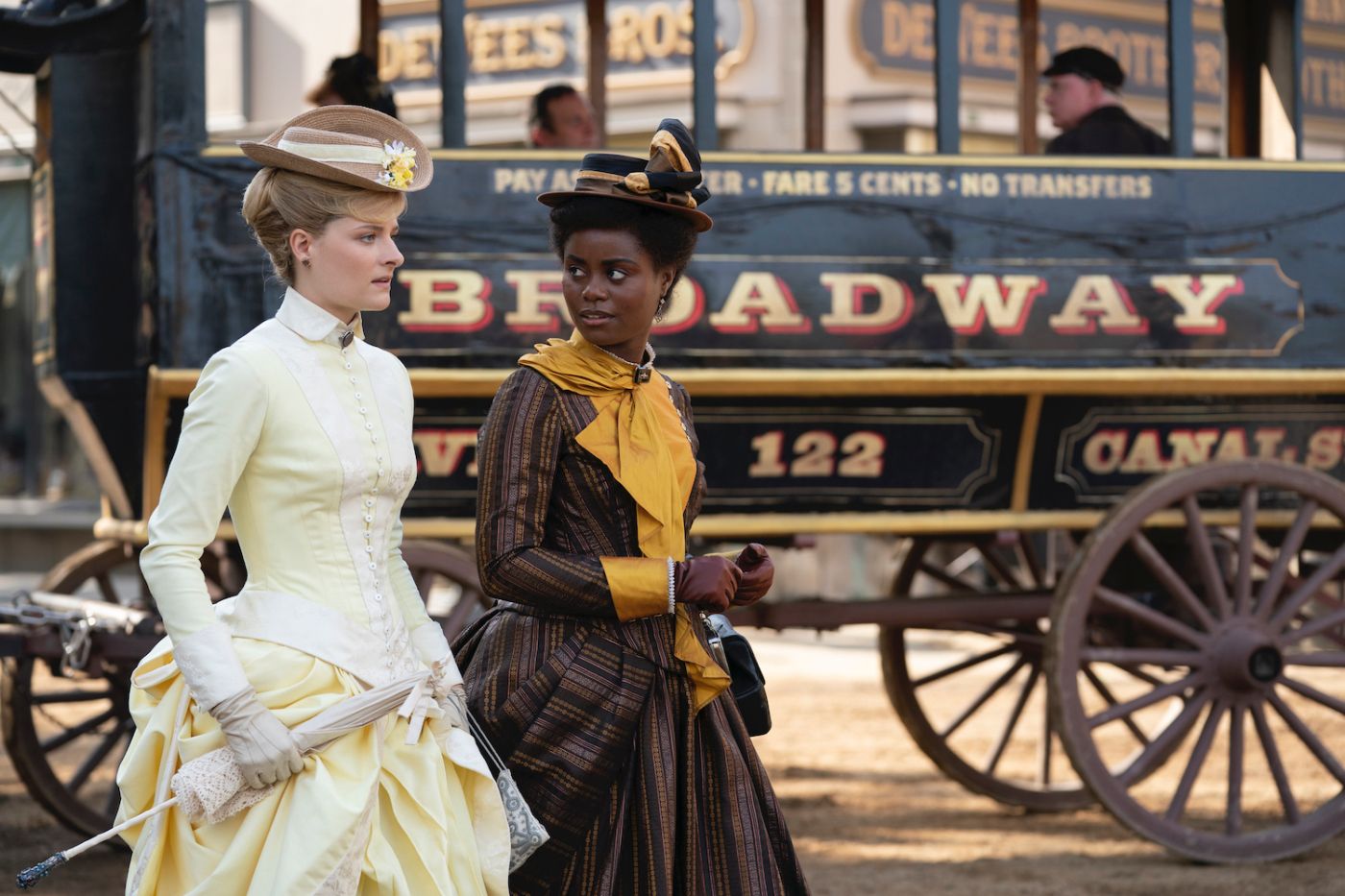On the surface, The Gilded Age is very much a Julian Fellowes joint — the historical drama heralded by an orchestral score that soon introduces a sprawling ensemble of faces. It's the creator's first series outing since Downton Abbey, and marks a tonal shift, like a more diabolical — and in some instances, almost crueler — American cousin by comparison. This is a show where the phrase "great gowns, beautiful gowns" isn't a backhanded compliment, although The Gilded Age is much more than its pretty window-dressing; there's snark, scheming, and plenty of men and women alike who plot against one another behind closed doors and bite back their barbs in favor of too-polite smiles.
The irony is that The Gilded Age was actually supposed to be a Downton prequel to begin with, with Fellowes first envisioning it as a spinoff book and then a series that would follow the beginnings of the romance between Lord and Lady Grantham. When it later became its own original show, it was intended for NBC in 2018 but then made the jump over to HBO by the following year — which, in hindsight, may have been the best move made for this not-a-Downton show. The resulting advantage is a platform that allows The Gilded Age to embrace some of its sexiest and simultaneously darkest aspects without having to tone down the material in order to comply with broadcast network standards and practices. There is nudity, yes, but what stands out more starkly than that is a particular ruthlessness and ambition amongst the characters, some of them in spite of their economic circumstances — and all done while wearing the kind of fashion made for jaw-dropping entrances.
While Downton Abbey was home to many actors from across the pond who became wider household names — and used the series as a springboard into other, bigger projects (looking at you, Dan Stevens), The Gilded Age is a show that feels inherently New York, inherently American, because of the talent that makes up its cast, many of them with their origins on the Broadway stage to boot. Christine Baranski plays socialite Agnes van Rhijn, who descends from an older generation of wealth and is compelled to retain her status even as newer millionaires move in right across the street — and while she is capable of uttering the most withering remarks over a delicate teacup, she also occasionally reveals her kinder side toward those she deems worthy of those glimpses. Cynthia Nixon is a much gentler foil as Agnes' sister Ada, a spinster who depends wholly on her sister's generosity and shares her home — and the Odd Couple-esque dynamic between the two injects a much-needed dose of levity into what would otherwise be an acutely harsher drama. Much of that ingredient comes from their new neighbors Bertha and George Russell, played by Carrie Coon and Morgan Spector, social climbers whose objectives to not only carve out a niche for themselves in wealthy circles but grow their already-impressive fortune earn them plenty of enemies in the process.
Coon's performance in The Gilded Age is astounding, a delicate balancing act that lands somewhere between ambition and callousness, with her character's outwardly collected facade crafted by a combination of draping her figure in devastatingly gorgeous dresses (serious hat tip to costume designer Kasia Walicka-Maimone) and pretending not to care what anyone thinks about her. In private, Bertha's desperation to be accepted by her peers — who already look down on her because the modern means by which the family acquired its fortune are considered in poor taste — drives her toward hosting lavish parties and literally throwing money around, which in turn only puts her on the receiving end of more scorn. It seems there's nothing she can do correctly, so instead, she and her husband decide to stop playing by society's rules and start making their own.
The show's main focus is undeniably wrapped up in this element of wealth — who has it, who wants it, and who may be willing to do anything to keep it. Even if it does give us a glimpse into the inner lives of those characters in the employ of the van Rhijn sisters or the Russells, those plotlines are more relegated to the sidelines than they were when Fellowes was lingering on the divide between upstairs and downstairs in his previous series. It might not help that, next to the servants, the Gilded Age cast that plays the wealthier elite consists of so many more identifiable faces (Audra McDonald! Kelli O'Hara! Jeanne Tripplehorn! Nathan Lane! Katie Finneran, for those of us who are still mourning Wonderfalls!), making their stories that much more memorable. One side plot in particular, which revolves around an ambitious maid who can barely hide her disdain for the lady she serves, feels so close to a Downton retread that one half-expected her to recreate the infamous soap bar placed under the bathtub moment.
All that aside, however, what makes The Gilded Age actually serve as an evolution for Fellowes as a creator rather than a step backward is how the series handles other issues apart from the typical class divide — and writer Sonja Warfield's contributions are very much felt here. Nowhere better is this illustrated than in the dynamic between Marian Brook (Louisa Jacobson), who discovers her father has left her penniless and travels to Manhattan to live with aunts Ada and Agnes, and Peggy Scott (Denée Benton), an aspiring writer who is at constant odds with her father (John Douglas Thompson) over her career choice. The friendship between the two women is an unlikely one from the start when they meet by chance on the train to New York, but The Gilded Age does something very interesting in that it periodically focuses on the way Peggy is regarded very differently in society as a Black woman, with the camera lingering on subtle moments of microaggression directed against her, moments that are often juxtaposed against Marian's inherent privilege in the very same scene. The series doesn't present a fantasy version of the 1880s in which racism doesn't exist, but even more importantly, it gives Peggy enough screentime to have her own story independent of the other characters — primarily, as she seeks to become a published writer and, by extension, potentially finds a romance of her own with handsome newspaper owner T. Thomas Fortune (Sullivan Jones). There's also an intriguing plot thread surrounding Agnes' son Oscar (Blake Ritson) trying to court the Russells' wide-eyed unmarried daughter Gladys (Taissa Farmiga), in part so that he can marry someone capable of turning a blind eye to his secret (and in this time period, illegal) relationship with another man.
Over the course of the first five episodes that were afforded to reviewers, The Gilded Age can occasionally feel like it's spinning its wheels rather than chugging full-steam ahead. With this big of an ensemble featuring so many powerhouses of acting, there's a lot of time that gets afforded to establishing where everyone is in their respective lives, and it's definitely groundwork that does need to be laid, but it sometimes happens at the cost of driving the plot forward in significant ways. Later on, however, the series starts to generate more momentum, courtesy of bigger drama and more severe repercussions for certain characters' actions, and it's in those events that The Gilded Age establishes itself as a title wholly independent of any that might have come before — provided viewers are willing to wade through the filler to get to the substance.
Rating: B+
The Gilded Age premieres Monday, January 24 on HBO, with new episodes airing weekly each Monday thereafter.



